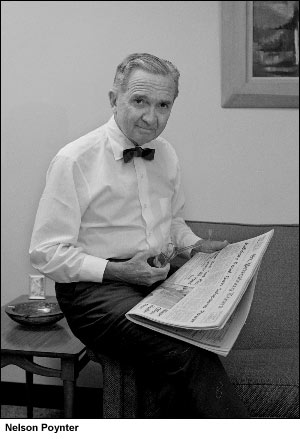From humble beginnings ...
When the first issue of a humble country weekly appeared on July 25, 1884, the Pinellas peninsula was part of Hillsborough County and St. Petersburg did not exist. The owners – a doctor, a pharmacist and a printer – called their new venture the West Hillsborough Times. The four-page paper was printed in the back room of a pharmacy in the tiny settlement of Dunedin. It had a circulation of 480.
Over the next 17 years, the paper changed hands six times. It moved from Dunedin to Clear Water Harbor and then to St. Petersburg in 1892, four years after the railroad reached the southern end of the peninsula and spurred creation of the new community.
That community had no greater champion than W.L. Straub, who with two partners bought the paper for $1,300 in 1901. He exhorted the little town by the bay to uplift itself with better roads, schools and government, to beautify itself with parks and a publicly owned waterfront, to sell itself to the tourist market up north. He also led the crusade for independence for the Pinellas peninsula, which the Legislature split off from Hillsborough County in 1912.
The Times grew and improved, moving to twice-weekly publication in 1907 and six days a week in 1912. But it never prospered as a business. Responding to Straub’s ad in a trade journal, Indiana publisher Paul Poynter bought the paper in September 1912 and set about improving it. In the boom times of the 1920s, the Times began publishing seven days a week and built an eight-story building. But when the boom went bust, the paper fell on hard times. Poynter even lost control of the paper for several weeks in 1935.
Poynter’s son, Nelson, watched and learned from his father’s struggles. He became the Times’ general manager in 1938, its editor in 1939, its majority stockholder in 1947 (three years before his father’s death) and the most important figure in its history.
Over the four decades Nelson Poynter (shown below) ran the Times, Poynter transformed his father’s small, financially wobbly paper into a large, robust enterprise. He became one of American journalism’s most conspicuous figures – a liberal in a conservative community, an innovator in a sometimes stand-pat industry, a loner in a field increasingly dominated by chains.
He was damned as a Communist, a fool and a meddler, praised as a patriot, a genius and a visionary. And when he died in 1978, he did the most remarkable thing of all: He gave away his life’s work. He willed most of his newspaper’s stock to a private, nonprofit school for journalists – now called the Poynter Institute – so that the paper would remain locally owned, safe from the clutches of chains run by corporate outsiders who valued big profits over readers.
The executive whom Poynter designated to run the institute and the newspaper after his death was Eugene Patterson, a highly decorated veteran of World War II who had been a Pulitzer Prize winner at the Atlanta Constitution and managing editor of the Washington Post.
When he retired in 1988, Patterson honored Poynter’s wishes and passed the baton of leadership to Andrew Barnes, a Post editor he had brought to the Times in 1973. In 2004, Barnes was succeeded by Paul C. Tash, who had started at the paper as a summer intern in 1975.
Under Nelson Poynter and his successors, the paper grew in size – it is now the largest daily paper in Florida and 25th largest in the country – and reputation. Widely regarded as one of the top dozen papers in the country, the Times has won 12 Pulitzer Prizes.
The paper grew as the region grew, first into Clearwater, then northward into Pasco, Hernando and Citrus counties. In 1987, the paper expanded into Tampa and its fast-growing suburbs. As Patterson told readers, the communities of the region were growing together into “Florida’s biggest city … the city of Tampa Bay.’’
Poynter’s successors faced formidable challenges. Some stock that Poynter had reluctantly sold his sister in 1947 eventually ended up in the hands of investors led by billionaire Robert Bass in 1988. For two years, Bass and the Times sparred over ownership of the paper in the courts of law and public opinion. The Bass group ultimately agreed to sell its stock to the paper for $56-million.
Under Tash’s leadership, the paper faced the worst newspaper economy since the Great Depression and fundamental changes in readers’ needs and tastes. For more than a hundred years, the Times could concentrate on one product, the paper. Now, it also offers electronic delivery of the news – via the Web – and a free daily tabloid for younger readers in a hurry.
In a memo in 2008, Tash called on the staff “to recommit ourselves to the difficult but vital work of adapting the Times to changing consumer tastes and challenging economic times. By bringing our creative energy and best efforts to this task, we serve the best interests of our customers, our company and ourselves. Now, let’s get on with it.’’
On Nov. 1, 2011, Tash announced a change decades in the making: the St. Petersburg Times will change its name to reflect what it had already become. On Jan. 1, 2012, the newspaper became the Tampa Bay Times.
As Florida’s best and largest newspaper continues to expand its reach and audience, the new name represents the people and businesses we represent. We will put our good name toward the future of the Tampa Bay region. The Times became the region’s sole metropolitan daily in 2016 when it acquired the Tampa Tribune.
“I anticipate great things ahead,” Tash said, “both for the Times and Tampa Bay. That is our history, and it will be our future.”
Updated by Suzanne Palmer
News Administration manager